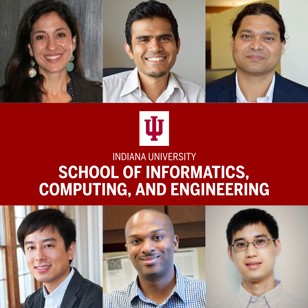
(Clockwise from upper left) Dana Habeeb, Vikram Jadhao, Sameer Patil, Qin Zhang, Donald Williamson, Norman Su
Junior faculty at the School of Informatics, Computing, and Engineering are making their mark in their respective fields, and they have the grants to prove it.
Four faculty members have earned prestigious Faculty Early Career Development (CAREER) Awards from the National Science Foundation over the past two years, and two other faculty members have received the NSF’s CISE Research Initiation Initiative (CRII) Award.
“At SICE, we’re working on some of the most pressing problems facing humanity today,” SICE Dean Raj Acharya said. “Our faculty have worked to develop the use of nanoparticles, improve security, share data to improve outcomes, and so much more in ways that impact real lives. Our faculty are leaders in their fields, and it’s critical that we recognize their research.”
The NSF CAREER Award is an NSF-wide activity that offers the National Science Foundation's most prestigious awards in support of early-career faculty who have the potential to serve as academic role models in research and education and to lead advances in the mission of their department or organization.
Assistant Professor of Intelligent Systems Engineering Vikram Jadhao earned a CAREER award for his proposal “Designing Surface Patterns for Adaptive Shape Control of Soft-Matter-Based Nanoparticles.” The research aims to design patterns for adaptive shape control of nanoparticles made from soft materials by establishing the connections between the surface patterns of nanoparticles and their mechanistic behavior using multiscale simulations powered by high-performance computing.
Assistant Professor Sameer Patil’s CAREER award was based on his proposal “Enhancing the User Experience of Privacy Preference Specification,” which aims to combat the so-called “privacy paradox,” wherein users say that privacy is important to them, but their actions show quite the opposite. He plans to develop methods that will allow users to specify their privacy preferences more effectively while also customizing privacy settings interfaces to fit users’ priorities.
Associate Professor Qin Zhang’s CAREER award, “Foundation of Communication-Efficient Distributed Computation and Monitoring,” will study fundamental algorithmic problems in databases, data mining, networking, and machine learning with the aim of creating a systematic theory of communication-efficient computing and monitoring that can have the potential to impact a wide range of rapidly developing areas in the theoretical foundations of big data.
Assistant Professor of Informatics Norman Su earned NSF CAREER award for his proposal “Integrating a Data-Driven Approach with Technologies for Sharing Rural Knowledge and Values.” His research will develop the theories and designs needed to inform the development of data-driven technologies to support and share the knowledge and values of rural America. Su’s work also centers on understanding the intersection of subcultures and technology, and how subcultures deny or adopt technologies to support their identities and ways of living.
The NSF’s CRII program, meanwhile, seeks to provide essential resources to enable early-career PIs to launch their research careers.
Assistant Professor Dana Habeeb received Computer and Information Science and Engineering Research Initiation Initiative (CRII) Award from the National Science Foundation for her work monitoring heat stress through environmental sensing. The grant will allow her to develop a new understanding of the effects of extreme heat events on human health and wellbeing, and will provide methods to mitigate heat hazards through more effective use of information technology and urban green infrastructure.
Assistant Professor Donald Williamson also has received an NSF CRII Award for his proposal “RI: Towards Human-Level Assessment of Speech Quality and Intelligibility in Real-World Environments.” His research focuses on the development of novel, data-driven assessment algorithms that use deep learning to better assess speech quality and intelligibility in real-world environments to improve the separation of speech from background noise for speech-based applications, such as hearing aids, robotics, and multimedia communication.
“We couldn’t be more thrilled with the work and the recognition our junior faculty have received from the NSF over the past several months,” said Kay Connelly, the associate dean for research at SICE. “Our School is a leader in so many areas, and we’re proud of our world-class faculty. Our researchers are conducting important work, and the recent awards are a tangible acknowledgement that the research has the potential to make a real impact.”

